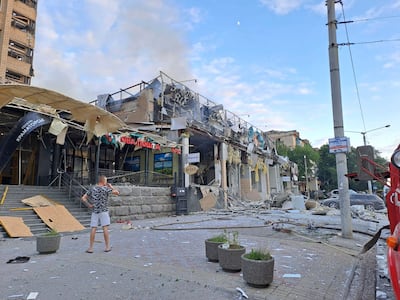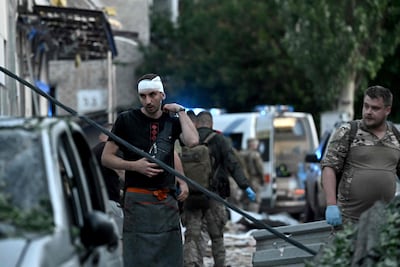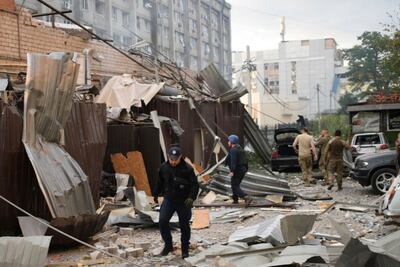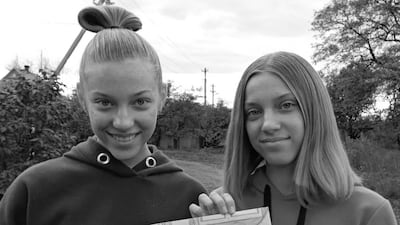A Russian missile strike on a crowded pizza restaurant in eastern Ukraine has killed 10 people, including 14-year-old twin sisters, and injured at least 61.
Four of the dead were children.
Announcing the deaths of the teenage twins on Telegram, the educational department of Kramatorsk City Council said: “Russian missiles stopped the beating of the hearts of two angels.”
The sisters have been named as Yulia and Anna Aksenchenko.
The other two children were believed to be 12 and 17 years old. The wounded included a baby born in 2022.
The building housing the restaurant, which was popular with soldiers and journalists in the town of Kramatorsk, was reduced to a twisted web of metal beams in the attack on Tuesday.
On Wednesday Ukrainian authorities arrested a man they accused of helping Russia direct the strike.
The Ukrainian Security Service announced it had detained a man – an employee of the local gas transport company – whom it suspects of directing the strike on the restaurant.
He filmed the restaurant for the Russians and informed them about its popularity, the security service said in a Telegram post.
Russia has insisted throughout the war that it does not aim at civilian targets, although its air strikes have killed many civilians.

“Strikes are only carried out on objects that are in one way or another linked to military infrastructure,” said Kremlin spokesman Dmitry Peskov on Wednesday.
Rescuers combed through the rubble to search for survivors as residents stood outside embracing each other and surveying the damage.
“I ran here after the explosion because I rented a cafe here. Everything has been blown out there,” said Valentyna, 64.
“None of the glass, windows or doors are left. All I see is destruction, fear and horror. This is the 21st century.”
A Belgian journalist who had just left the restaurant at the time of the attack told BBC Radio 4's Today programme on Wednesday that he had heard two “huge explosions” so turned back to see “dead people, people screaming, people crying, huge chaos”.
“There are still people underneath the rubble, because it’s a big restaurant. Now I can hear people still screaming underneath the rubble as rescuers are trying to save them,” he added.
Emergency services posted pictures online of rescue teams sifting through the site with cranes and other equipment.
The death toll rose to 10 on Wednesday after two more bodies were pulled out of the wreckage.
“As of now, rescuers have recovered the bodies of 10 people from the rubble,” Veronika Bakhal, spokeswoman for the Donetsk region emergency services, told Ukrainian television.
Eight people had been rescued alive from the rubble and at least three more were believed to be trapped, she said.
Donetsk regional governor Pavlo Kyrylenko said people were visible under the rubble. Their condition was unknown, he said, but “we are experienced in removing rubble”.
A second missile hit a village on the fringes of Kramatorsk, injuring five, but most of the casualties were at the restaurant.
Ukrainian President Volodymyr Zelenskyy said in his nightly video message that the attacks showed that Russia “deserved only one thing as a consequence of what it has done – defeat and a tribunal”.
Kramatorsk, a major city west of the front lines in Donetsk region, is one of the largest in the east still under Ukrainian control.
The city has been a frequent target of Russian attacks, including a strike on the town's railway station in April last year that killed 63 people. There were at least two strikes on apartment buildings and other civilian sites earlier this year.
The attack came as Ukraine wages a counter-offensive against Russian troops.
Ukraine's Defence Minister said the country had not yet staged the “main event” in the operation.
“When it happens, you will all see it. Everyone will see everything,” Oleksiy Reznikov told the Financial Times in an interview published on Wednesday.
Days after the aborted rebellion by Wagner head Yevgeny Prigozhin, widely seen as the biggest threat to Kremlin authority in decades, Kyiv said the mutiny's influence on fighting was minimal.

But as Moscow announced preparations to disarm Wagner fighters, jailed Kremlin critic Alexei Navalny launched a scathing attack against Russian President Vladimir Putin in his first comments since the aborted mutiny.
“There is no bigger threat to Russia than Putin's regime,” Mr Navalny said on social media.
In The Hague, Nato chief Jens Stoltenberg said it was still too early to draw conclusions from Mr Prigozhin's move to Belarus, probably with some of his forces, but he vowed that the alliance was ready to defend its members.

Mr Prigozhin, a former Kremlin ally and catering contractor who built Russia's most powerful private army, has boasted – with some support from news footage – that his men were cheered by civilians during his short-lived revolt.
But Mr Putin insisted that Wagner's ordinary fighters had seen that “the army and the people were not with them”.
Russian officials have been trying to put the crisis behind them for three days, with the FSB dropping charges against rank-and-file Wagner troops and the military preparing to disarm the group.
But questions remain over how the Kremlin allowed the violence of its war in Ukraine to spill back into Russia.
On Tuesday, the UN said Russian troops had carried out “widespread and systematic torture” of civilians detained in Ukraine since it invaded last year, adding it had evidence that Russian troops had summarily executed at least 77 detained civilians.
“It is a war crime … it's also a gross violation of international human rights law,” said Matilda Bogner, head of the mission.
Meanwhile, Pope Francis's envoy, Cardinal Matteo Maria Zuppi, began a visit to Russia on Tuesday in a first such trip since Mr Putin sent troops to Ukraine in February 2022.
His trip comes several weeks after he met Mr Zelenskyy in Kyiv.
“We highly value the efforts and initiatives of the Vatican in looking for a peaceful solution to the Ukrainian crisis,” said Mr Peskov said. “We welcome them.”


